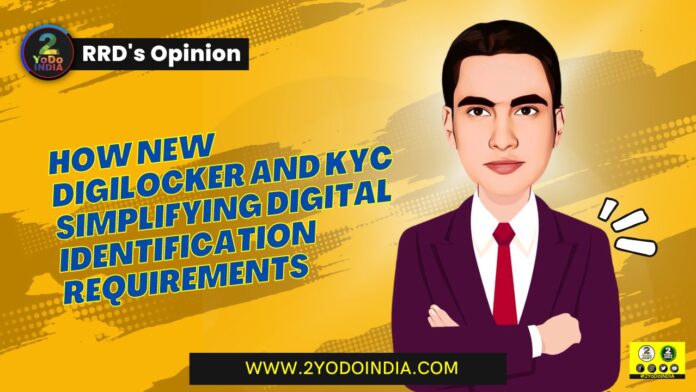The process of being identified is when a personal identifier is link to a person who displays certain characteristics. The procedure in digital financial services is heavily reliant on customer identity and verification.
Customer due diligence’s client identification and verification components are the only ones cover by the phrase KYC (Know Your Customer).
The purpose of KYC registries is to provide a central location for the storage of customer identity information for usage by various financial service providers.
Digital ID
Digital ID is important at many points when utilising various online services like financial services.
It facilitates the opening of transaction accounts for the unbanked, enables effective social benefit disbursement, allows for cost-effective onboarding that can be complete remotely by financial service providers, and supports the uptake of additional products and services, all of which support the development of the financial sector.
Digital identity verification is evolving across various sectors due to initiatives for digital transformation.
Service providers now-a-days seek a secure and safe way to conduct e-KYC and identity verification as account opening moves online.
Employing digital IDs rather than manual or paper-based procedures for consumer identification verification offers higher levels of assurance.
Using a digital ID makes it frequently possible to instantly verify a customer’s identity.
Financial inclusion faces a lot of obstacles because of a lack of legal identification.
By making identity easier to obtain and manage, digital identity management technologies can facilitate greater financial inclusion.
In the Indian aspect, digital inclusion has gain momentum due to the flagship initiative of the government of India, DigiLocker.
DigiLocker is a safe Cloud-based platform for managing, distributing, and authenticating documents and certificates by providing people’s digital document wallets access to real digital documents, enabling fast digital identification and quick consumer onboarding.
Digital identities grant by state, federal, and other recognise agencies are store by individuals in one place using Digilocker.
The presence of all the valid certified documents has open up a new window for a fast KYC process.
This has gone up the identification process and has provide error-free data collection.
It has also increase the efficiency of fintech companies to store and share data securely and quickly.
Future of DigiLocker
The expansion of Digilocker will lower the operating expenses of financial institutions.
On the public Cloud, digital documents are reliable and easily accessible for fast identity and address verification and reconciliation.
Authorise authorities, banks, regulators, and other recognise business entities can access Digilocker documents for an instant KYC process.
The paperless procedure makes a risk-based strategy possible, allowing fintech lenders to develop novel products.
This can increase the fintech lenders profitability and enable them to expand their coverage.
Customers will benefit from lower costs and quicker turnaround times.
DigiLocker Growth
Union Budget 2023–2024 has expand support for the Indian fintech sector.
To make it simple to access financial services for both individuals and businesses, the enhance Digilocker platform enables a simplified Know Your Customer (KYC) approach.
Digilocker will be a one-stop shop for developing a dynamic, risk-based KYC procedure for various financial services.
The adoption of DigiLocker will increase further as the Digital India initiative is expect to boost the country’s digital economy from $200 billion in 2018 to $1 trillion by 2025.
RRD’s Opinion
Artificial intelligence, distributed ledgers, biometric data, and other technologies are opening up new possibilities for e-KYC.
These technologies are use by e-KYC to develop fresh strategies that are more practical and affordable.
Stakeholders are creating cutting-edge solutions based on these technologies to fulfil their due diligence obligations in both the public and private sectors.
With the current initiatives and the growing awareness of DigiLocker, its reach will multiply in the near future.
The Digilocker platform is design with easy user access and privacy, which will strengthen its use across fintech companies.
Fintech companies have more scope for innovation with digital storage and sharing essential KYC documents.
Rahul Ram Dwivedi (RRD) is a senior journalist in 2YoDoINDIA.
NOTE : Views expressed are personal.





